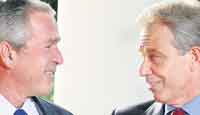| |
|||||
No boom for Bush and Blair NEW YORK- When Tony Blair became an unrepentant US ally following in the dangerously close footsteps of the Americans in their overseas military misadventures, the British Prime Minister was described as a political lapdog of the White House. Perhaps a more biting comment came from an American comedian who said, rather sarcastically, that Blair would never have a sun-tanned skin because he lives perpetually in the dark shadow of the US president. But last week was a week of political contrition for the military sins committed in Iraq. At a joint news conference in Washington DC, the British Prime Minister and the US President, long joined at the hip, admitted the rash of mistakes before and after the invasion of Iraq. While conceding their collective bungling, they still refused to admit their monumental blunder in invading Iraq.
Back in 2003, Bush was so confident of a "cake walk" victory in Iraq that he challenged the Iraqi insurgents to "bring it on": an American macho phrase daring the enemy into battle. At the White House last week, Bush said he regretted throwing that challenge. And three years later, the insurgents are still holding the upper hand turning Iraq into a Vietnam-like military quagmire for the Americans. The death toll of both American soldiers and Iraqi civilians has kept mounting into the thousands. Bush was also repentant that he was determined to get Osama bin Laden "dead or alive:" reminiscent of posters outside the sheriff's office in gun-blazing Hollywood Westerns. Both challenges projected an aggressive pride — backed by firepower — that was staple of cowboy movies. As the New York Times said, the outside world got the impression that Bush was "a cowboy commander in chief" of the United States. "Kind of tough talk, you know, that sent the wrong signal to the people," Bush sheephishly admitted to reporters. "I learned some lessons about expressing myself maybe in a little more sophisticated manner." Bush also said one the biggest military mistakes was the mistreatment and humiliation of Iraqi prisoners in the notorious Abu Ghraib prison outside Baghdad. The images that were splashed across newspapers and TV screens throughout the world did irreparable damage both to the US and the American military. Irene Khan, Secretary-General of Amnesty International (AI), told reporters last week: "What we are looking at is the situation of the Iraqi people, the human rights of Iraqi people, and whether those that are responsible for upholding them are doing so, and that means looking at the Iraqi government, looking at the coalition forces, US, UK and others, and looking at the armed groups in Iraq. In every case there has been a dismal failure to protect the human rights of Iraqi people." Speaking during the launch of AI's 2005 annual report in London, she warned that the US war on terror does not justify violations of human rights and the rule of law. The US keeps arguing that virtually everything is permissible — including tapping telephones and transgressing civil liberties — in the name of fighting terrorism. Khan said: "The war on terror and the way it has unfolded actually is premised on the principle that by eroding human rights you can reinforce security," she pointed out. "And that is why as part of the war on terror we see restrictions being placed on civil liberties around the world." In short, she said, the war on terror is provoking more terror. She also criticised the infamous US-run Guantanamo Bay detention centre "where people that are considered to be dangerous by the US Administration are being locked up without any charge, without any trial, indefinitely." "That cannot be the best way in which you fight terrorism. Because it plays straight into the hands of those who would want to destroy human rights," she declared. Blair, who has been politically crucified in his home country for sending British troops into Iraq, has seen his popularity taking a heavy beating in polls. So has Bush. As he plans to step down as Prime Minister, Blair is also looking to leave behind a political legacy. And so is Bush. But neither may succeed. When a reporter hinted that this may be Blair's last official visit to Washington in his capacity as British premier, Bush had to frantically come to his rescue. "Don't count him out," said Bush, consoling his political buddy, "Let me tell it to you that way. I want him to be here so long as I am the president." Bush will leave office in 2009. But Blair's party leaders may want him out of 10 Downing Street long before that day. Meanwhile, if the opposition Democratic Party gets an overwhelming victory in the upcoming November elections in the US, there is speculation that both the House of Representatives and the Senate may have the required Democratic votes to call for an impeachment of Bush for his failures in both domestic and foreign policy.
|
|||||
Copyright © 2006 Wijeya Newspapers
Ltd. All rights reserved. |
|||||
